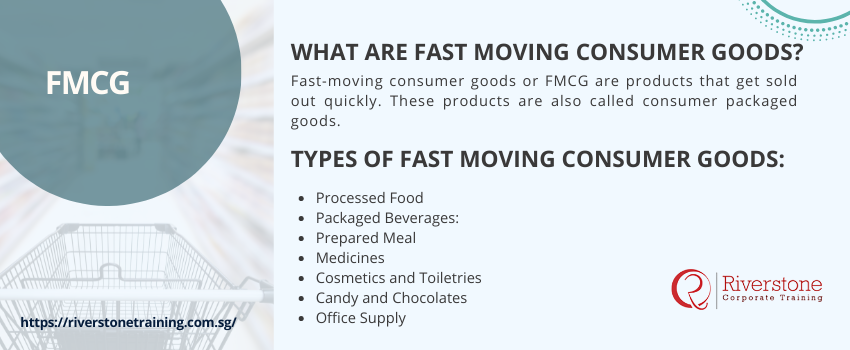
WHAT ARE FAST MOVING CONSUMER GOODS?
Fast-moving consumer goods or FMCG are products that get sold out quickly. These products are also called consumer packaged goods. The FMCG products have a very high demand in the market. People love having them or need them regularly; as a result, they sustain for a short period on the shelves.
TYPES OF FAST MOVING CONSUMER GOODS:
The FMCG product category includes a wide variety of food products, which are made available to consumers through retail stores. Milk, packed juice, chips, all these are a type of Fast Moving Consumer Goods (FMCG) products. These FMCG products are categorized, which looks like this:
Processed Food:
This is one of the tastiest foods. People love having processed food, which results in frequent sales. The category of processed food includes cheese, boxed pasta etc.
Packaged Beverages:
These are very refreshing. Especially in the summers, they are one of the go-to options. Packaged beverages include energy drinks and tetra packed fruit juice.
Prepared Meal:
These are ready to eat meals. This category of Fast Moving Consumer Goods (FMCG) serves the purpose. People are hungry, and they don’t have time to cook. So this results in good sales.
Medicines:
This category is a necessity more than anything else and includes all the medicines, health and hygiene products, test kits etc. It’s something which is frequently sold and shopped.
Cosmetics and Toiletries:
It is again something that serves the purpose and has a long shelf life. This category includes all hair care products, soaps and all sorts of makeup.
Candy and Chocolates
These are the most category of fast-moving consumer goods products and target all ages of consumers from kids to older people. Candy and chocolates are fast-moving and sold by many companies like Nestle, Cadburys, etc. Huge consumer demand makes its shelf life shorter.
Office Supply:
Office supplies like pens, notebooks, paper, printing inks etc. are a type of FMCG product. Like food, makeup and toiletries, it is a need of all the businesses and companies and therefore bought by people frequently as the results in a great business.
Navigating the Singaporean FMCG Landscape:
The article should be a comprehensive piece of writing, which covers in detail as to what the dynamics of the Singapore FMCG market are and what the common trends are. This information ought to investigate consumer trends peculiar to Singapore (e.g., the need of healthier choices, sustainability trends, online shopping, the culture of convenience). Explain the ways local and international FMCG brands are adjusting to such trends, such as long-term digital marketing strategies, e-commerce openings, and sustainability actions to the packaging process in Singapore. In particular, the benefits of e-commerce business model for startups are increasingly relevant, as digital-first strategies help new FMCG entrants bypass traditional retail costs and connect directly with niche consumer segments. Give a review of the competitive environment, indicating opportunities as well as threats to either new or existing players in the city-state.
Optimizing the FMCG Supply Chain in Singapore – From Shelf to Consumer:
Loyalty to a supply chain remains a great determinant of the success of FMCG companies in Singapore. Such firms have to deal with items of a high volume and low profitability, which are perishable items in a time-sensitive and a space-limiting urban setting. The strategic planning and execution is needed to face the challenges like maintain level of optimal inventory, timely distribution and elimination of waste. Such best practices as the just-in-time inventory, demand planning, or responsive logistics frameworks are a must among FMCG players.
Singapore’s advanced infrastructure and technological readiness offer opportunities to leverage automation, data analytics, and real-time tracking to optimize the entire supply chain—from procurement to last-mile delivery. Companies can enhance operational performance by investing in-house FMCG operations training workshops in Singapore, which help supply chain teams stay updated with current tools and practices. Additionally, scalable interactive e-learning development for supply chain training in Singapore ensures workforce readiness across distribution, warehousing, and inventory control roles. The warehousing solutions should be very closely aligned with the last mile delivery and even the process of learning on the basis of returns. All this should fall in line with the Singaporean consumer expectations of speed, reliability and freshness constituting the supply chain excellence as a strategic issue in the local FMCG industry.
CONCLUSION:
FMCG products are products that are always in high demand. These products get the right amount of profit for the companies, as most of these products are necessities of the consumers.


